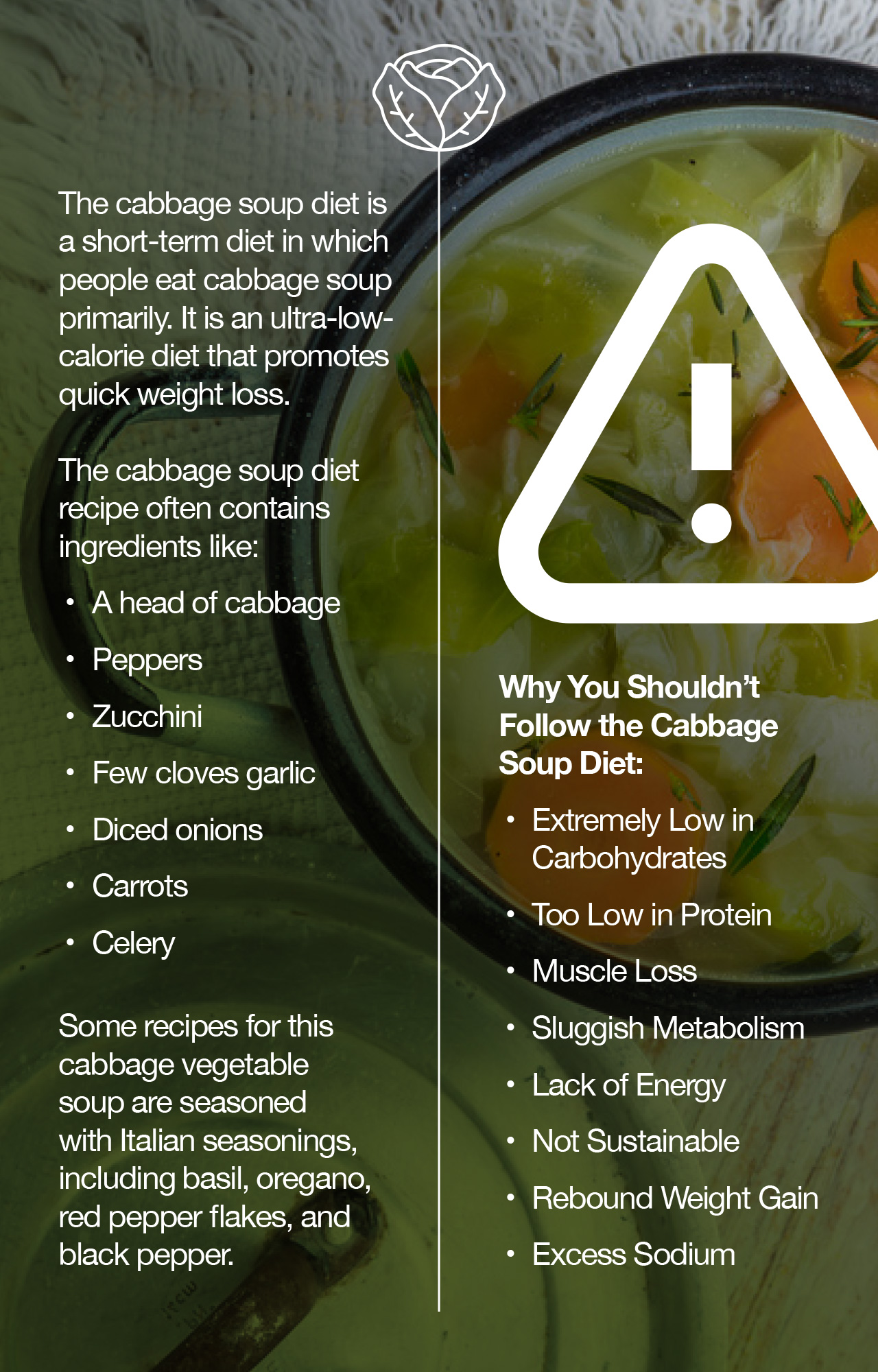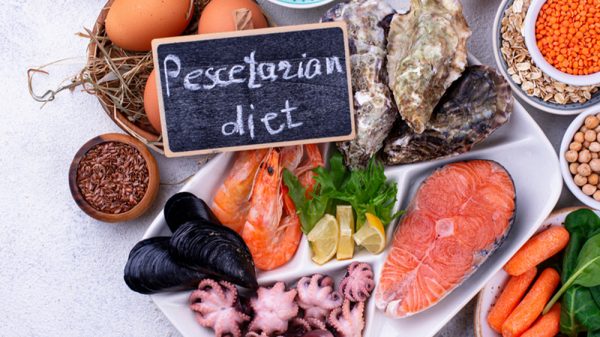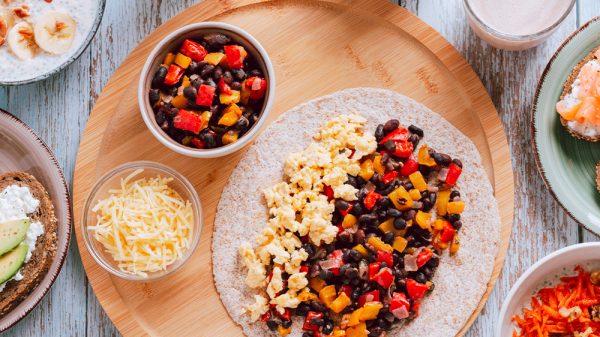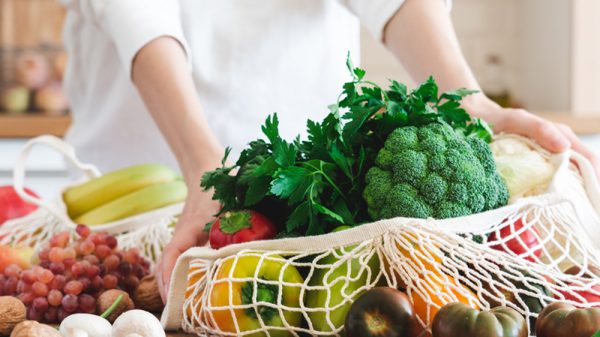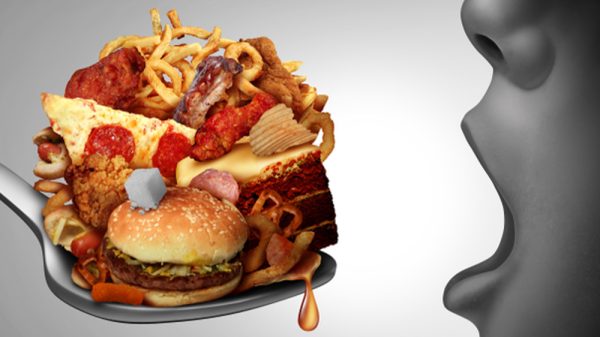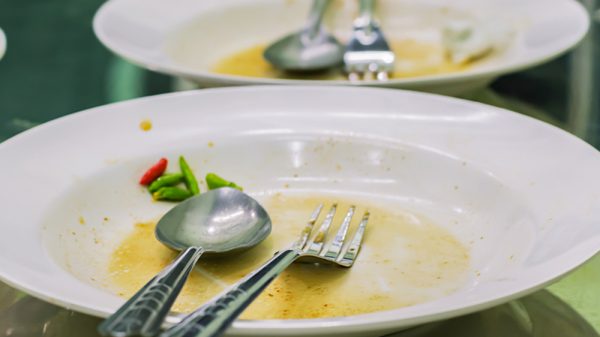Have you heard of the cabbage soup diet? This regimen is a crash diet plan that incorporates cabbage soup as the primary food. The diet plan is designed to yield rapid weight loss. However, ironically, the cabbage soup diet can ultimately lead to weight gain. This diet is just one example of many fad diets that can actually worsen your health, rather than improve it. Read on to find out more.
What Exactly Is the Cabbage Soup Diet?
The cabbage soup diet is a short-term diet in which people eat primarily, well, cabbage soup. Generally, cabbage soup is made with a thin broth and vegetables like cabbage. So, how does the cabbage soup diet work? While some versions claim that the cabbage soup diet helps detox the body, this diet is basically an ultra-low-calorie diet, drastically slashing your calorie intake to promote quick weight loss.
The cabbage soup diet recipe often contains ingredients like a head of cabbage, peppers, zucchini, a few cloves garlic, diced onions, carrots, and celery. Some recipes for this cabbage vegetable soup are seasoned with Italian seasonings, including basil, oregano, red pepper flakes, and black pepper.
An internet search of the cabbage soup diet yields various interpretations of this low-calorie diet plan. But the general premise is that cabbage soup is the foundation of your diet for an entire week. Each day of the week allows a very narrow selection of additional foods, like fruits, veggies, unsweetened fruit juice, brown rice, baked potato, skim milk, and beef.
Why You Shouldn’t Follow the Cabbage Soup Diet
The reasons why you shouldn’t follow the cabbage soup diet are also applicable to other diets that are extremely low in calories.
1. Extremely Low in Carbohydrates
Diet culture has caused a lot of anxiety around carbohydrates. So many extreme diet plans demonize carbohydrates and advise you to cut carbohydrates out of your diet. The cabbage soup diet is similarly a low-carb diet. Aside from a few carbs from the cabbage and veggies and any small addition from other foods, this diet plan is extremely low in carbohydrates. The severe restriction of carbohydrates can leave you feeling low in energy and tired. The body requires carbohydrates to power all biological processes. When we eat carbs, the body breaks down carbohydrates into glucose molecules that are absorbed by cells and organs.
It is true that some carbs are bound to spike your blood sugar levels. For example, refined carbs like white bread, white flour, and white pasta are readily broken down into glucose and lead to higher levels of blood sugar. When eaten in excess over a long period of time, these foods can contribute to the risk of developing metabolic conditions like type two diabetes and insulin resistance.
However, diets like the cabbage soup diet generalize this fact to all carbohydrates. The reality is that unrefined carb sources like whole grains and sweet potatoes are packed with fiber and other nutrients that support your health and well-being.
2. Too Low in Protein
The cabbage soup diet is extremely low in protein, meaning that you’re not getting the amino acids that your body needs to function optimally. Aside from beef and skim milk on certain days, there are nearly no other high-quality protein sources that offer balanced ratios of essential amino acids.
3. Muscle Loss
The cabbage soup diet may result in rapid weight loss, much of which is likely water weight. However, as a consequence of lower protein intake restriction, the body begins to lose lean muscle tissue. Without optimal ratios of essential amino acids from high-quality protein sources, the body can’t continue to maintain muscle tissue.
Moreover, it’s difficult to sufficiently use your muscles when following a low-calorie diet. It’s challenging to muster up enough energy to workout out or engage in any type of physical activity when hungry. Leaving muscles unused can contribute to muscle wasting.
4. Sluggish Metabolism
Muscle tissue requires more energy to maintain, which increases your resting metabolic rate. When the body isn’t getting the protein it needs and muscle tissue breaks down, the metabolism slows down considerably. As a result, after following the cabbage soup diet, you may gain fat more easily than you did before following the diet.
5. Lack of Energy
Following a 7-day diet of primary cabbage soup can take a toll on your energy levels. Lower muscle mass, insufficient carbohydrate intake, and severe calorie restriction can lead to low energy levels, weakness, and fatigue.
6. Not Sustainable
Though the cabbage soup diet is only meant to be followed for 7 days, even that can be too long. Extreme calorie restriction for days on end is very challenging to sustain. By the end of the first day, the body will be sending hunger cues in an effort to get the energy and nutrients it needs.
The result is an overwhelming sense of hunger, strong cravings, and the desire to eat a large quantity of food. It’s only a matter of time before willpower isn’t enough and you give in, whether after the first day or after the seventh.
Plus, the mentality that you must adhere to a starvation diet is simply unhealthy, both physically and psychologically. Mentally, a strict diet like the cabbage soup diet makes us feel like we must follow a very specific set of rules. If we break these rules, then we feel like we “failed” at following the diet.
7. Rebound Weight Gain
Rebound weight gain is almost guaranteed after following an extreme diet plan. Hunger, deprivation, and a lower metabolic rate are a perfect storm for rebound weight gain following the cabbage soup diet.
8. Excess Sodium
Depending on how you prepare cabbage soup, this diet plan can add excess sodium to your diet. Many broths and bouillon cubes are high in sodium. Over time, consuming lots of sodium can contribute to high blood pressure. Eating too much cabbage soup made with salty broth can increase your sodium intake.
Is There Anything Redeeming About the Cabbage Soup Diet?
Though some claim that cabbage has fat-burning properties, this isn’t exactly the case. However, a positive thing about the cabbage soup diet is that it encourages a higher consumption of vegetables, including cabbage. Other veggies that can be included in the cabbage soup weight loss plan are onions, spinach, tomatoes, and colorful bell peppers, like red and green peppers.
Veggies are an important addition to your diet, boosting your intake of fiber and disease-fighting vitamins, minerals, and antioxidants. For example, potassium and vitamin C are crucial nutrients that come from vegetables. However, keep in mind that you can add more health-promoting veggies to your diet without the extreme calorie restriction that’s characteristic of the cabbage soup diet.
The cabbage soup diet also encourages hydration, suggesting that one drinks up to 8 glasses of water per day. Staying hydrated is an important way to help increase circulation by keeping blood volume up, while also flushing toxins out of the body.
If You Still Have Your Heart Set on the Cabbage Soup Diet, Here’s What You Can Do
If we have not been able to convince you that the cabbage soup diet is a bad idea, here are some ways that you can make it healthier to follow.
Bulk Up the Cabbage Soup
There’s nothing inherently bad about cabbage soup, but you can enhance the nutritional value of the soup by adding other food groups. In addition to cabbage and broth, add in ingredients like shredded chicken breast, beans, and quinoa. Not only will these foods amp up the nutrient density and calorie content of the soup but also enhance the flavor profile of the meal.
Don’t Restrict Other Foods
In addition to cabbage soup, aim to eat a variety of fruits, veggies, whole grains, nuts, seeds, dairy, fish, and lean meats. Supplementing the cabbage soup with a vast array of foods ensures that the body is getting the carbs, healthy fats, essential amino acids, vitamins, minerals, and antioxidants to support your health and help you feel your best.
Use Low-Sodium Broth
A low-sodium vegetable broth or chicken broth helps reduce your sodium intake and keep your blood pressure levels in check.
Things to Keep in Mind
Before starting any diet plan or new supplement, it’s important to talk to your doctor to ensure that the changes you’re making best support your health. A registered dietitian is also an excellent resource for making a meal plan that best supports a healthy weight.
Conclusion: What’s Wrong with the Cabbage Soup Diet
Like so many fad diets, the cabbage soup diet plan is extremely low in calories and does not contain a balance of all the nutrients the body needs to function. This weight loss diet is based on restrictive rules in an effort to get quick results, instead of supporting long-term weight loss. However, rapid weight loss is unhealthy, often leading to a loss of muscle mass. To make a healthier version of the cabbage soup diet, try bulking up your cabbage soup with whole grains and beans. In addition to your cabbage soup meals, supplement your diet with a variety of foods from all food groups.
